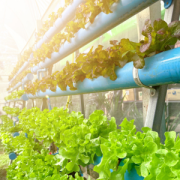AMPLIFY VOL. 37, NO. 5

The agri-food supply chain ecosystem is complex, involving farmers, agricultural cooperatives, manufacturers, distributors, traders, wholesalers, and retailers.1 In contrast to other food supply chains (e.g., automated canned food), the agri-food supply chain faces issues related to short shelf life; seasonality; quality and quantity variability; strict regulations; specific requirements for transport, handling, and storage; price variability; and weather dependence.2
The main function of the food system and its primary sector, agriculture, is to satisfy the basic human need for food, but sustainable food systems also maintain ecosystem health and contribute to social well-being.3 Nevertheless, our ability to feed a growing global population is under threat.4
Recent global events highlight the vulnerability of agri-food supply chains (and supply chains in general) to exogenous shocks and the importance of developing resilient supply chains.5 For example, the COVID-19 pandemic impacted 86% of supply chains in the UK.6
Supply chain resilience refers to the ability of supply chains to efficiently and cost-effectively plan for, respond to, and recover from disruptions. This includes taking actions that return the supply chain to its original state (or better than before the disruption).7
A resilient supply chain is characterized by four dimensions:
-
Preparedness
-
Response
-
Recovery
-
Growth or adaption
Supply chain disruptions are defined by the Food and Agriculture Organization of the United Nations (FAO) as “unforeseen events that interfere with the normal flow of goods and/or materials.”8 It has been reported that organizations experience 15 supply chain disruptions annually.9 To mitigate disruptions, supply chain organizations need to:
-
Identify and understand vulnerabilities in the business landscape and assess vulnerabilities throughout the supply chain
-
Determine what part of the supply chain can best address and manage the identified vulnerabilities
-
Strengthen supply chain elements to mitigate vulnerabilities by enhancing processes, systems, and practices
Against this backdrop, agri-food supply chain organizations are seeking innovative solutions such as AI-based systems to improve sustainability, transparency, and resiliency.
AI in a Nutshell
At a basic level, AI is a collection of technologies that combines large quantities of data, algorithms, and computing power to focus on a single task (i.e., face recognition). At a higher level, AI technologies aspire to replicate human behavior, referred to as “artificial general intelligence.”10 Al systems have rapidly evolved from applications like decision support systems to systems that can solve complex problems and perform specific tasks. AI is an umbrella term for the six functions listed in Table 1.11
Machine learning (ML), expert systems, robotics, and natural language processing (NLP) are the dominant AI functions being studied in agri-food supply chains as part of our ongoing research project.
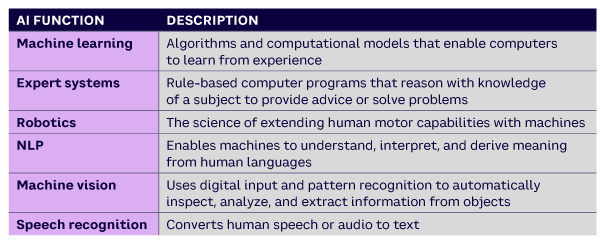
Research Methodology
This article is informed by two types of data (secondary and primary). The secondary data is based on a recent study that synthesized and categorized the reported challenges encountered by practitioners in the agri-food industry.12 The primary data is based on a survey of nine questions related to themes, including AI-based information processing, supply chain resilience, and performance. Each question was measured on a seven-point Likert scale, with extreme points ranging from 1 equals strongly disagree to 7 equals strongly agree. The survey was circulated to practitioners in the agri-food sector (see Table 2). 151 responses were gathered, of which four were invalid.
Participants had an average of four years’ industry experience in this sector, and their roles varied from C-level executives to operations management. Data analysis was conducted using structural equation modeling, which provides statistical procedures for testing survey measurements and hypotheses.
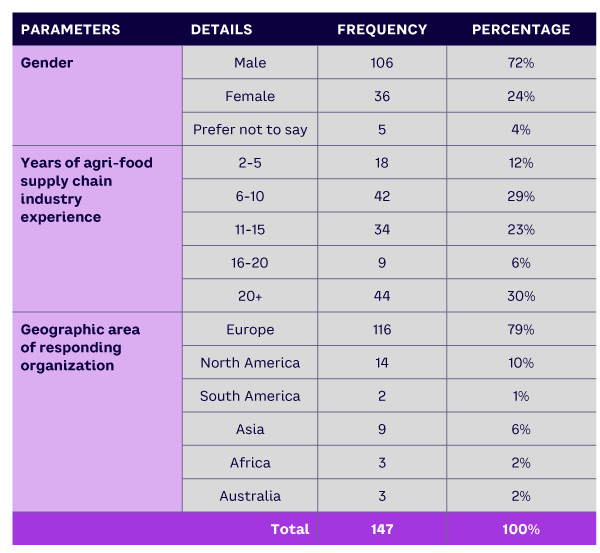
Key Challenges in the Agri-Food Supply Chain Industry
The challenges described in Table 3 are based on the analysis of 76 studies that focused on the agri-food supply chain industry.13 The impact of supply chain disruptions has an inherent cost (e.g., financial, resource, raw material).
For example, the Russia-Ukraine crisis disrupted fertilizer and animal feed throughout Europe, immediately hitting farmers involved in pork production who bore that cost for several months before it hit meat processors by way of increased livestock costs. Meat processors then bore the cost for several months while negotiations took place with customers. Production, throughput, and food chain were lost forever — an unexpected consequence of such a crisis. In Ireland, 2023 saw a nearly 10% drop in total pork production compared to the previous year, due to significant losses and high operating costs. At the national level, there are now fewer than 200 productive units.14
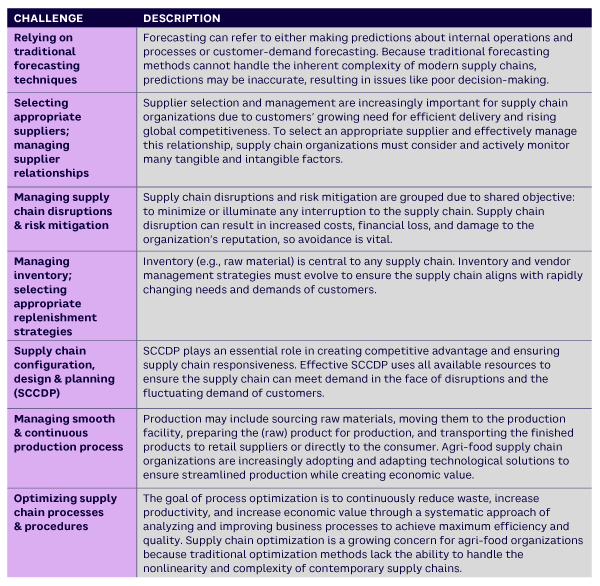
How Can AI Add Value to the Agri-Food Industry?
Anecdotal evidence indicates that AI offers transformational power to support executives responsible for dealing with exogenous shocks and enabling resilient supply chains.15 Analysis of the primary data used in this study shows that AI-enabled information processing can build resilience in agri-food supply chains, reducing food waste and improving performance. The potential benefits and applications of Al in the agri-food industry are described in Table 4.
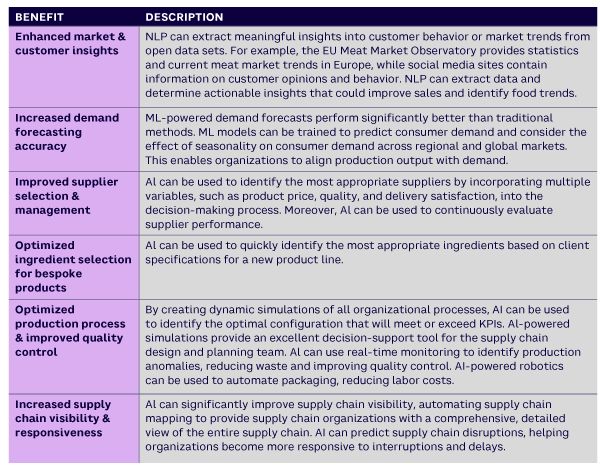
Looking Toward the Future
Although AI holds much promise to transform agri-food supply chains (see Figure 1), considerable managerial and organizational challenges will need to be addressed.16 These challenges will require a concerted effort between academia, the supply chain industry, and policy makers to ensure its transformative power is realized through rigorous, evidence-based research. For example, a recent study showed that security is a major concern for adopters and non-adopters in operations and supply chain management.17
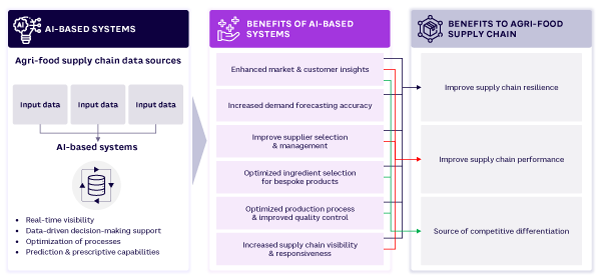
A collective effort to use AI in this context will provide economic value in several ways. First, it could be a vehicle to achieve the EU’s ambitious target to cut the unintentional loss of food mass in agri-food supply chain industry in half by 2030.18 Almost 57 million tonnes of food waste are generated annually with an associated market value estimated at €130 billion (about US $140 billion).19
Second, it could help farmers produce more food. Supplies must increase by 70% by 2050 to meet the needs of the world’s growing population, according to the FAO.20
Third, investing in AI and emerging technologies can contribute to sustainable livelihoods, hunger reduction, and generating income in both developed and developing countries, which is critical for the transition to a sustainable food system. A food system “gathers all the elements (environment, people, inputs, processes, infrastructures, institutions, etc.) and activities that relate to the production, processing, distribution, preparation, and consumption of food, and the outputs of these activities, including socioeconomic and environmental outcomes.”21
Awareness without action is fantasy, so we call on industry leaders, academics, and governments to actively engage in the design, development, and deployment of AI solutions to make the world a better place for all.
References
1 Spanaki, Konstantina, Erisa Karafili, and Stella Despoudi. “AI Applications of Data Sharing in Agriculture 4.0: A Framework for Role-Based Data Access Control.” International Journal of Information Management, Vol. 59, August 2021.
2 Zissis, Dimitris, Emel Aktas, and Michael Bourlakis. “A New Process Model for Urban Transport of Food in the UK.” Transportation Research Procedia, Vol. 22, 2017.
3 Zamani, Efpraxia D., et al. “Artificial Intelligence and Big Data Analytics for Supply Chain Resilience: A Systematic Literature Review.” Annals of Operations Research, Vol. 327, September 2022.
4 “Agriculture & Food System.” European Environment Agency (EEA), 4 March 2024.
5 Dennehy, Denis. “Ireland Post-Pandemic: Utilizing AI to Kick-Start Economic Recovery.” Amplify, Vol. 33, No. 11, 2020.
6 “Coronavirus Impact Felt by 86% of Supply Chains.” Supply Chain Movement (SCM), 20 March 2020.
7 Vanpoucke, Evelyne, and Scott C. Ellis. “Building Supply-Side Resilience — A Behavioural View.” International Journal of Operations & Production Management, Vol. 40, No. 1, August 2019.
8 Scholten, Kirstin, Mark Stevenson, and Dirk Pieter van Donk. “Dealing with the Unpredictable: Supply Chain Resilience.” International Journal of Operations & Production Management, Vol. 40, No. 1, January 2020.
9 Vanpoucke and Ellis (see 7).
10 Dennehy (see 5).
11 Smyth, Conn, et al. “Artificial Intelligence and Prescriptive Analytics for Supply Chain Resilience: A Systematic Literature Review and Research Agenda.” International Journal of Production Research, 23 April 2024.
12 Smyth et al. (see 11).
13 Smyth et al. (see 11).
14 Kelly, Lorcan Roche. “The Crisis Threatening Ireland’s Pig Farming Industry.” Irish Farmers Journal, 3 January 2024.
15 Zamani et al. (see 3).
16 Fosso Wamba, Samuel, et al. “Industry Experiences of Artificial Intelligence (AI): Benefits and Challenges in Operations and Supply Chain Management.” Production Planning & Control, Vol. 33, No. 16, April 2021.
17 Fosso Wamba, Samuel, et al. “Are Both Generative AI and ChatGPT Game Changers for 21st-Century Operations and Supply Chain Excellence?” International Journal of Production Economics, Vol. 265, November 2023.
18 ”EU Platform on Food Losses and Food Waste.” European Commission, accessed May 2024.
19 EEA (see 4).
20 “Achieving SDG 2 Without Breaching the 1.5 °C Threshold: A Global Roadmap, Part 1.” Food and Agriculture Organization of the United Nations (FAO), 2023.
21 “Food Losses and Waste in the Context of Sustainable Food Systems: A Report by the High Level Panel of Experts (HLPE) on Food Security and Nutrition.” HLPE Report 8, FAO, 2014.


